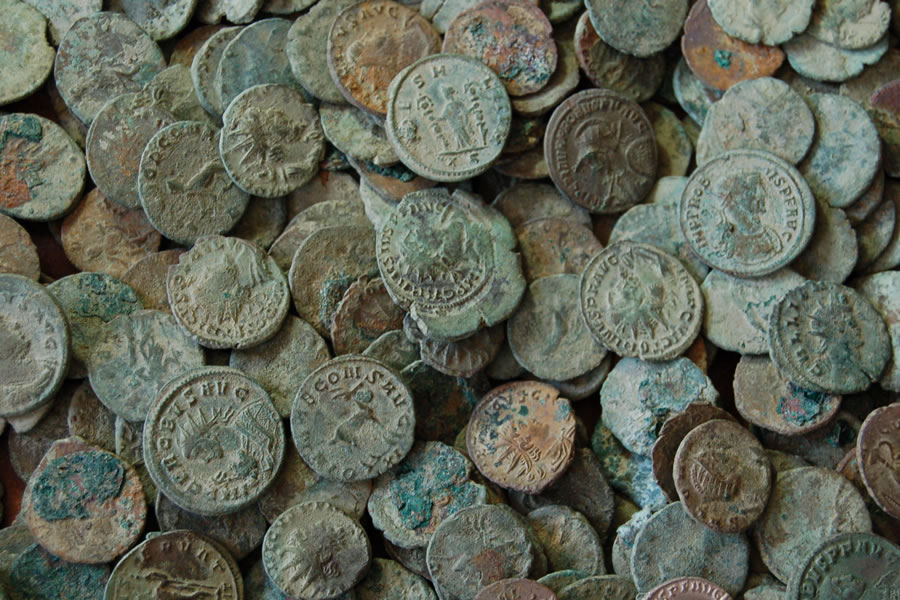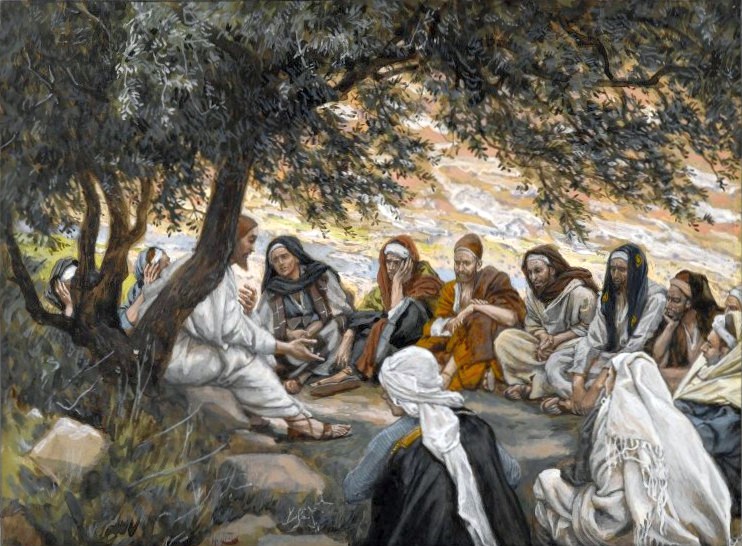Corpus Christi Blog

Christian Stewardship - Treasure
09-29-2019Weekly ReflectionJennifer ArnoldGreetings! This week we will discuss the final pillar of Christian Stewardship which is Treasure. Discussion about how we are good stewards of our treasure always seems to be a little more sensitive than the other two pillars of Christian Stewardship. It is quite common to convince ourselves that if we had more, then we’d give more rather than vice versa. Why do we all hate to talk about money? Jesus Himself did not find it at all awkward to talk to us about how to approach our money and material belongings. Take a look at these Gospels that are jam-packed with stories about money and belongings: The Rich Young Man (Mt 19:16-24), The Workers in the Vineyard (Mt 20:1-16), Paying Taxes to the Emperor (Mt 22:15-22), The Parable of the Talents (Mt 25:14-30), The Poor Widow’s Contribution (Mk 12:41-44), The Good Samaritan (Lk 10:29-37), The Parable of the Rich Fool (Lk 12:16-21) and The Parable of the Lost Coin (Lk 15:8-10).
Typically, when we are talking about being good stewards of our treasure, we are talking about almsgiving, or tithing. Tithing is a way to give money to our parish, diocese, or other specific organizations in order to direct our collective money in a streamlined fashion to build up our parish, Church, and the members of our community who are in need. The Catechism of the Catholic Church addresses economic activity and how it relates to the Body of Christ. “Everyone has the right of economic initiative; everyone should make legitimate use of his talents to contribute to the abundance that will benefit all and to harvest the just fruits of his labor. He should seek to observe regulations issued by legitimate authority for the sake of the common good” (CCC #2429). In other words, we each have a right to earn money and material goods through the gifts of our talents and we have a right to reap the fruits of our work, but with those rights comes the obligation to use those material gains for the common good of the entire Body.
READ MORE
Christian Stewardship - Talent
09-22-2019Weekly ReflectionJennifer ArnoldLast week we discussed what it means to be good stewards of our time. This week, we’ll take a closer look at what it means to be good stewards of our talent.
First, we must understand what is meant when we refer to our talents. God has bestowed on each of us particular gifts, graces, and charisms which are specific and unique to each of us individually. Reflecting on the image of the Body of Christ, it is easy to understand why He distributed these gifts so diversely. A body cannot be made up entirely of eyes, for example, or it would not also be able to run or listen. A body must have all of its many parts which each have the properties fitting to that part to make the entire body work properly. So too, we, the members of the Body of Christ, must have gifts proper to each of us so His Body can function as it should, according to His will.
READ MORE
Christian Stewardship - Time
09-15-2019Weekly ReflectionJen ArnoldGreetings! As a new member of the Pastoral Council, Father Chad asked me to lend him a helping hand by writing a series of articles on Christian Stewardship.
Over the last several weeks (and years!), Father Chad has been working hard to help form us into intentional disciples. Both in his homilies and in his bulletin articles, he has explained our parish mission statement and what it means to be a disciple of Christ. Included within the many characteristics of being a disciple that Father has already laid out for us is the quality of Christian Stewardship which is composed of the three pillars of Time, Talent, and Treasure. When we, as disciples, are being good stewards of these three things, we give God our first fruits to build up His Kingdom and the Body of Christ through which He then blesses us abundantly in return. Today, we will take a closer look at how we are to be good stewards of our time to serve God and in the coming weeks we’ll examine the other two.
READ MORESt. Josemaria Escriva's 17 characteristics of a person who lacks humility
09-08-2019What's Your Story?- Thinking that what you do or say is better than what others do or say;
- Always wanting to get your own way;
- Arguing when you are not right or — when you are — insisting stubbornly or with bad manners;
- Giving your opinion without being asked for it, when charity does not demand you to do so;
- Despising the point of view of others;
- Not being aware that all the gifts and qualities you have are on loan;
- Not acknowledging that you are unworthy of all honour or esteem, even the ground you are treading on or the things you own;
- Mentioning yourself as an example in conversation;
- Speaking badly about yourself, so that they may form a good opinion of you, or contradict you;
- Making excuses when rebuked;
- Hiding some humiliating faults from your director, so that he may not lose the good opinion he has of you;
- Hearing praise with satisfaction, or being glad that others have spoken well of you;
- Being hurt that others are held in greater esteem than you;
- Refusing to carry out menial tasks;
- Seeking or wanting to be singled out;
- Letting drop words of self-praise in conversation, or words that might show your honesty, your wit or skill, your professional prestige…;
- Being ashamed of not having certain possessions…
Read the original article here.

Discipleship (part 2)
09-08-2019Weekly ReflectionFr. Chad KingLast week, we learned from the original disciples that discipleship is a journey; it is an intentional process of becoming fully alive and happy even while on this earth, excitedly anticipating life everlasting in Heaven. That is the reason for the “Becoming Disciples” in our vision statement. Those part of the parish about four years ago may recall that I asked parishioners to read and join our discussion on the book Forming Intentional Disciples. I had first read it about eight years ago (one year into my priesthood). It described what I had observed in the Church in every parish where I had been in but had been unable to articulate. I reflected on how my relationship with Jesus had indeed influenced, directed, and become central in my life. I recognized that it was my relationship and love for Jesus that made the sacraments alive and placed choosing and living my faith as priority #1. However, as I read the five thresholds of a journey to discipleship described in the book, I remembered ways I had grown to become a disciple. The five thresholds include:
READ MOREDiscipleship is becoming ready for Heaven
09-08-2019HomiliesFr. Chad KingRaise your hand if you want to go to Heaven? Good everyone’s hand is raised.
Raise your hand if you want to become a Disciple of Jesus? I should see everyone’s hand- Because as we will see becoming a disciple is what it takes to enter Heaven.
Raise your hand if you think you are a Disciple of Jesus? 5%- bulletin, Becoming Disciples is part of our Vision statement as a parish. - demanding cost of discipleship.
Gospel- Confusing and hard statement- unless we hate our family member’s we cannot be Jesus’ disciple? How can God who is love, who called us to love our enemies, and honor our father and mother- call us to hate the very same people we are called to love and honor?
What does Jesus mean? Perhaps Matthew’s version of this passage will clarify. “Whoever loves father or mother, or son or daughter more than me is not worthy of me”
So how might you sometimes love your family more than God? Say you go on vacation or to your sons or daughter’s sporting event or something- if you don’t try to find a Mass where you are then you are loving your family more than God.
READ MORE
Discipleship (Part 1)
09-01-2019Weekly ReflectionFr. Chad KingNow that we have looked a little bit at what being the Body of Christ means – both as members of the larger universal Church and also as members of Corpus Christi – let us turn our attention to the next part of our vision statement and what it means to Become Disciples.
If we were to ask the average Catholic what the Catholic Church is about, I imagine most of the answers would focus on the sacraments and helping people get to Heaven. However, while the sacraments are the means by which the Church fulfills its mission and purpose, the actual mission of the Church is the last command Jesus gave to the 11 remaining disciples: “Go, make disciples of all nations, baptizing them in the name of the Father, and of the Son, and of the Holy Spirit, teaching them to observe all that I have commanded you” (Mt. 28:19). Thus, for us and indeed for every Catholic Church, our mission, our purpose, what we must be about, is to first become disciples and to make disciples.
READ MORE